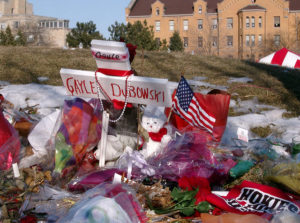Aurora Illinois Shooting – Five Keys to Coping
On February 15th, Aurora, Illinois was witness to a mass shooting at the Henry Pratt Company. This tragedy came on the day following Valentine’s Day, eleven years after the death of my daughter in a shooting at Northern Illinois University. Like the shooting at NIU in 2008, the gunman involved in the Aurora shooting claimed five lives before it ended. This time, one of the victims was an NIU student, and another an alumnus.
Our hearts ache for the families, friends, co-workers affected by this tragedy. We wish they didn’t have to go through what we went through. We wish all of them peace and healing. But since this happened, we want them to know that healing is possible. There is hope.
In the paragraphs that follow, I want to share five things that made a difference for me in the aftermath of the 2008 NIU shooting. This is not an exhaustive list, but it includes ideas that can pave the way for healing. This information is especially intended for those closest to the Aurora shooting—especially families of the victims and those who were wounded or witnesses.
Believe You Will Get Through This
I suspect there are those who will read the above heading as “Think positively. Everything will be okay.” That is not at all what I mean. People were wounded in the Aurora shooting. Five of them have died, as did the shooter. Everything is not okay. Thinking positively will not change that. People have witnessed and experienced a horrible and terrifying event. Trying to “think positively” is not going to help. In fact, trying to resist terrifying or sad thoughts can lead them to persist.
“Believing that you will get through this” refers to having an expectation of healing and resilience. After traumatic events such as this, you are more likely to cope with what has happened by seeing yourself as able to do so than those who do not. This is true, even if the “how” is not at all clear in the present. Even if you have no clue, knowing that you will figure it out will sustain you as you do.
Having this attitude and belief left my wife and I open to the possibility of recovery. And it made us skeptical of those who said foolish things like “You’ll never get over ___.” In spite of our brokenness, it left a door open for hope and healing.
Guard Your Minds
As I watched and listened to the uninterrupted coverage of the NIU shooting in 2/14/08, it became clear that they repeatedly offered the same information. Each repetition added little to what was reported earlier. This simply added to my uncertainty about our daughter’s safety and increased my anxiety.
Once I realized this, I muted my television. With the news muted, I was again in command of my thoughts. I was better able to calm my fears. Worrying would not change the situation.
Watching news coverage of traumatic events such as the Aurora shooting magnifies them, especially when watched or heard repeatedly. The images and sounds become etched in our brains. Repetition is a key to learning. Repeating images of the world as a terrifying place “teaches us” that the world is terrifying. These images and stories then dominate our thoughts; we become ever on guard. As a result, we become blind to the good around us.
Turn off the radio. Silence the news.
Remember that Grieving is Normal, and Relationships Unique
As individuals, families, and communities come together for vigils, memorials, funerals and the like, remember that grief is normal. It can feel complicated, because it sometimes is. Relationships are unique, and so are your feelings about what has happened. Accept your feelings as normal and natural, without judging whether you “are doing it right.”
And instead of comparing what you are feeling or doing with what someone else’s experience, be compassionate and empathetic listeners.
Be Patient
You are more likely to hear people say things that are unhelpful than are helpful. Even people we respect as knowledgeable about faith and psychology can disappoint us. We live in a society that does not prepare us for dealing with loss, and that discourages talk about grief. So, don’t be surprised.
Be patient, too, with the investigation processes. Most people want immediate answers when a crime of this magnitude occurs. This does not make the job of investigation of the crime go any smoother, or any more accurate. Proper investigation takes time, and we must give them time to complete it.
Know Yourself (or Discover Yourself)
This might be the first crisis of this magnitude you have ever experienced. How we respond in crisis can surprise us. It can bring out the worst in some of us, the best in others. Which has it been for you? Here are some things to consider:
- Fear is one of the most common and natural reactions to loss. Many of us freeze when afraid; others become angry. Look for help to moderate these reactions. There is no shame in either.
- It might be hard to know whether you need solitude or company. Are you hungry or not? Tired or wired? When we are numbed (or on high alert) because of a traumatic event, we might not know. Ask others you trust to help you make up for the lost sense of need that has been turned off. And don’t worry; your self-awareness will return.
Conclusion

I hope some of these reflections and suggestions are helpful to you or to someone you care about. I realize they might not mean anything to most of the people who follow my past articles. But they might make a difference in your life one day. Or you might want to share them with someone you know who can benefit now (especially someone affected by the recent Aurora shooting).
And I will be happy to talk with and answer questions for anyone who calls or emails me.
Additional information on recovery from grief and bereavement can be found at https://www.griefrecoverymethod.com.




